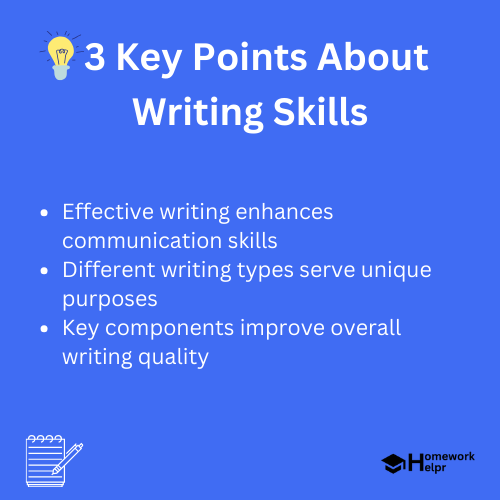📝 Summary
Writing is a powerful tool for expressing thoughts and sharing emotions. Strong writing skills are essential for academic and career success, enabling effective communication. Key aspects discussed include the importance of writing for academic success, professional growth, and personal expression. Different types of writing include descriptive, narrative, expository, and persuasive writing. Essential components of effective writing comprise clarity, structure, style, and grammar. Tips for improving writing skills are to read regularly, practice daily, seek feedback, and edit. Overall, developing writing skills facilitates better communication and fosters personal and professional growth.
Writing Skills: The Art of Effective Communication
Writing is a powerful tool that allows us to express our thoughts, convey information, and share our emotions. Having strong writing skills is essential for both academic and personal success. In this article, we will explore the different aspects of writing skills, including their importance, various types of writing, key components of effective writing, and tips for improving these skills.
The Importance of Writing Skills
In today‚’ world, the ability to communicate effectively through writing is more important than ever. Good writing skills can open numerous doors, both in education and in career opportunities. Here are a few reasons why these skills are essential:
- Academic Success: Clear and coherent writing is crucial for writing essays, reports, and research papers.
- Professional Growth: Employers highly value employees who can communicate well in written form, whether it‚’ through emails, reports, or proposals.
- Personal Expression: Writing allows individuals to express their thoughts, ideas, and emotions creatively.
Stronger writing skills can lead to better grades and increased confidence in sharing one‚’ ideas.
Types of Writing
Writing can be divided into several distinct categories, each with its own purpose and style. Understanding these types is essential for developing versatile writing skills. Here are some common types:
- Descriptive Writing: This type focuses on providing a vivid description of a person, place, event, or object, enabling readers to visualize the subject.
- Narrative Writing: Narrative writing tells a story, often with a clear sequence of events and characters, aimed at engaging the reader.
- Expository Writing: This form explains or informs, presenting facts and information without personal opinion.
- Persuasive Writing: The aim here is to convince the reader of a particular viewpoint or action, often employing strong arguments.

Key Components of Effective Writing
To become a proficient writer, understanding the key components of effective writing is critical. These components work together to create clear, engaging, and impactful content:
- Clarity: Good writing should be easy to understand, avoiding jargon and overly complicated language.
- Structure: Organizing content logically provides a roadmap for readers, typically including an introduction, body, and conclusion.
- Style: Each writer has a unique style, which can include word choice, sentence structure, and tone that appeals to the intended audience.
- Grammar and Mechanics: Correct grammar, punctuation, and spelling are essential for professionalism.
Focusing on these components can lead to more effective communication and improve overall writing quality.
Definition
Clarity: The quality of being clear and easy to understand.
Mechanics: The conventions for using grammar, punctuation, and spelling in writing.
Tips for Improving Writing Skills
Improving your writing skills is a continuous process that requires practice and dedication. Here are some practical tips to enhance your writing:
- Read Regularly: Reading a variety of texts exposes you to different styles and helps improve vocabulary.
- Practice Writing Daily: Set aside time each day to write, whether it be journaling, blogging, or composing short stories.
- Seek Feedback: Share your writing with peers or teachers to receive constructive criticism.
- Edit and Revise: Take the time to revisit your drafts, correcting errors and improving clarity.
By incorporating these strategies into your routine, you’ll see significant improvements in your writing skills.
💡Did You Know?
Did you know that the average person spends about 19 hours a week writing? This includes everything from emails and text messages to social media posts!
Examples to Illustrate Different Writing Types
Example
For descriptive writing, a text might describe a beautiful sunset: “The sky exploded into vibrant shades of orange and pink, as the sun dipped below the horizon, painting the clouds in brilliant colors.”
Example
In narrative writing, one might craft a story about a brave knight who learns valuable lessons on his quest to rescue a captured prince, facing challenges and discovering courage along the way.
Conclusion
In conclusion, developing strong writing skills is essential for academic and professional success. By understanding the importance of writing, familiarizing oneself with different types, mastering key components, and employing practical tips for improvement, anyone can become a better writer. Remember, writing is not just about putting words on paper; it‚’ about effectively communicating your thoughts and ideas.
So, grab a pen or open your computer, and start practicing your writing skills today!
Related Questions on Writing Skills
What are writing skills?
Answer: Writing skills are the abilities to express thoughts clearly and effectively in written form, essential for communication in various contexts.
Why are writing skills important?
Answer: Writing skills are crucial for academic success, professional opportunities, and personal expression, enabling individuals to convey ideas clearly.
What are the different types of writing?
Answer: The main types include descriptive, narrative, expository, and persuasive writing, each serving a unique purpose and style.
How can I improve my writing skills?
Answer: Improving writing skills can be achieved through regular reading, daily writing practice, seeking feedback, and revising drafts for clarity and correctness.
